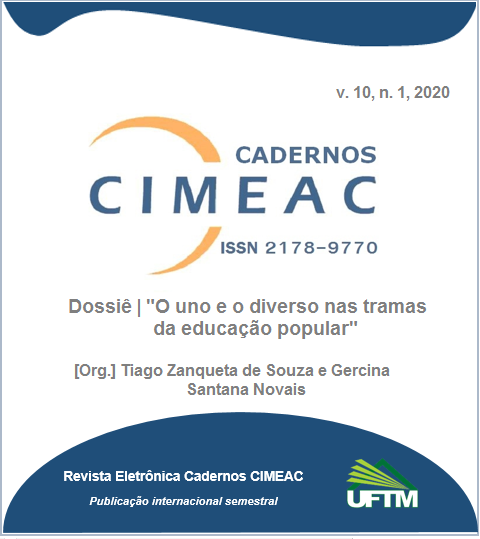A experiência do pré-vestibular popular Pedro Pomar: uma luta por educação popular e formação política em periferias urbanas / The experience of the popular pre-vestibular Pedro Pomar...
DOI:
https://doi.org/10.18554/cimeac.v10i1.4116Resumo
O presente artigo, que é fruto de uma pesquisa em andamento, objetiva inventariar e atualizar a luta por educação, em especial de um grupo de mulheres negras que fazem parte de um coletivo de estudantes do Pré-Vestibular Popular Pedro Pomar; pré-vestibular este, situado em Niterói, na região metropolitana do Estado do Rio de Janeiro. Do ponto de vista teórico-metodológico, fundamentadas em trabalhos anteriores produzidos no interior do Núcleo de Pesquisa Vozes da Educação, vimos optando pela pesquisa qualitativa de natureza etnográfica e participativa, na qual a pesquisa é concebida como uma experiência de conhecimento, e o trabalho de campo, longe de ser apenas um trabalho de coleta e produção de dados, ou de produção de conhecimentos e questões, possibilitando assim, um movimento de ação-reflexão-ação coletiva sobre o(s) processo(s) de produção do conhecimento, corroborando o que Santos defende como o papel político e epistêmico da pesquisa numa perspectiva emancipatória. Nesse percurso, provocadas pela força política, pedagógica e discursiva das longas lutas de mulheres pelo direito à educação, assumimos, no presente artigo, o pressuposto conceitual e político de que uma teoria é um dispositivo analítico para melhor conhecer o que ainda não sabemos, e também para produzir suspeições e estranhamentos naquilo que se apresenta como familiar, como, por exemplo, o descaso dos poderes públicos com a (re)produção da vida das classes populares, em especial a questão de sua escolarização. Procuraremos contextualizar o Pré-vestibular Popular Pedro Pomar, trazendo alguns elementos de seus repertórios de ação.
Palavras-chave: Movimento social; Mulheres negras; Direito à educação; Universidade pública.
Abstract: This article, which is the result of ongoing research, aims to inventory and update the struggle for education, especially from a group of black women who are part of a group of students of the Pre-College Popular Pedro Pomar; pre-university entrance exam, located in Niterói, in the metropolitan region of the State of Rio de Janeiro. From a theoretical-methodological point of view, based on previous work produced within the Voices of Education Research Center, we have opted for qualitative research of an ethnographic and participatory nature, in which research is conceived as a knowledge experience. , and the field work, far from being just a data collection and production work, or the production of knowledge and questions, thus enabling a movement of collective action-reflection-action on the process (s) of knowledge production, corroborating what Santos defends as the political and epistemic role of research in an emancipatory perspective. In this course, provoked by the political, pedagogical and discursive force of women's long struggles for the right to education, we assume, in this article, the conceptual and political assumption that a theory is an analytical device to better know what we do not know yet, and also to produce suspicions and strangeness in what presents itself as familiar, as, for example, the neglect of the public powers with the (re) production of the life of the popular classes, especially the issue of their schooling. We will seek to contextualize the Pre-College Popular Pedro Pomar, bringing some elements of his action repertoires.
Keywords: Social movement; Black women; Right to education; Public university.
Downloads
Publicado
Edição
Seção
Licença
Os autores que publicam nesta revista concordam com os seguintes termos:
(a) Não cobramos dos autores para a publicação neste periódico.
(b) Autores mantém os direitos autorais e concedem à revista o direito de primeira publicação, com o trabalho simultaneamente licenciado sob a Licença Creative Commons que permite o compartilhamento do trabalho com reconhecimento da autoria e publicação inicial nesta revista.
(c) Autores têm permissão e são estimulados a difundir e a distribuir a versão publicada de seu trabalho online (ex.: em repositórios institucionais ou na sua página pessoal) após o processo editorial, já que isso pode aumentar o impacto e a citação do trabalho publicado (Veja O Efeito do Acesso Livre).
* * *
AUTHORS COPYRIGHT AND PUBLISHING RIGHTS
Authors who publish with this journal agree to the following terms:
(a) This journal does not charge authors for publication.
(b) Authors retain copyright and grant the journal right of first publication with the work simultaneously licensed under a Creative Commons Attribution License that allows others to share the work with an acknowledgement of the work's authorship and initial publication in this journal.
(c) For authors whose articles have been accepted: authors are permitted and encouraged to post their work online (e.g., in institutional repositories or on their website) after the publication of the text in Cadernos CIMEAC, as it can lead to productive exchanges as well as earlier and greater citation of published work (See The Effect of Open Access).


 10.18554/cimeac
10.18554/cimeac


